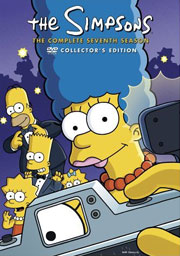 With the temperature dropping, it's time to find someone to keep you warm. Find your hookups with our online dating guide!
With the temperature dropping, it's time to find someone to keep you warm. Find your hookups with our online dating guide!
- Comedy
- 1995
- Buy the DVD
Reviewed by David Medsker
()
he first disc of “The Simpsons - The Complete Seventh Season” is quite possibly the most bulletproof collection of episodes ever assembled on a single DVD in this show’s entire series to date. “Who Shot Mr. Burns? (Part Two),” “Radioactive Man,” “Home Sweet Home-Dum-Diddly Doodly,” “Bart Sells His Soul,” “Lisa the Vegetarian,” and “Treehouse of Horror VI.” Classics, across the board, and the rest of the set is just as good. Season seven is also one of the most quotable seasons in the show’s history, starting in the very first episode, where Moe takes a lie detector test, and fails spectacularly:
Policeman Eddie: Do you hold a grudge against Montgomery Burns?
Moe: No! (Buzz) All right, maybe I did, but I didn’t shoot him! (Ding)
Eddie: Checks out. Okay, sir, you’re free to go.
Moe: Good, because I have a hot date tonight. (Buzz) A date. (Buzz) Dinner with friends. (Buzz) Dinner alone. (Buzz) Watching TV alone. (Buzz) All right! I’m gonna sit at home an ogle the ladies in the Victoria’s Secret catalog. (Buzz) (Pause) Sears catalog. (Ding) Now, would you unhook this already, please? I don’t deserve this kind of shabby treatment. (Buzz)
One noticeable aspect of this season over the previous six is the seriousness of the subject matter. Bart sells his soul to Milhouse for five bucks, convinced he’s swindling Milhouse out of easy money, and immediately regrets it. When he goes to buy it back from Comic Book Guy (Milhouse sold Bart’s soul for pogs), and discovers that someone who was very interested in owning a young boy’s soul had already purchased it (CBG’s reveal of this information benefits from a sinister read by Hank Azaria), Bart actually drops to his knees and prays. His prayer, almost instantly, is answered, as Lisa is the one who bought it back for him.
And that is just the beginning. Lisa deals with being a vegetarian in a meat-eating society, Marge gets embroiled in a class struggle with some high society classmates, Homer meets his fugitive mother (a sweet performance by Glenn Close, though we learn in the commentary that she just couldn’t get the “D’oh!” right at the end), the town of Springfield becomes a hotbed of anti-immigrant sentiment, and Homer abuses the disability statutes in order to stay home. Last but not least, Homer and Marge are deemed to be unfit parents, and the kids are placed with their new foster parents….the Flanders family. All of these episodes are side-splittingly funny, but they also treat their subject matter with respect. In fact, Paul and Linda McCartney lend Lisa some emotional support on her struggles to stay the veggie course, but the commentary reveals that McCartney would only do it if Lisa remained a vegetarian. To this day, the producers have remained true to their word.
This is not to say that the shows are bogged down by third-rail subject matter. “Team Homer,” where Homer forms a bowling team with Moe, Apu and Otto, routinely ranks among he fans as one of the best episodes in the show’s history, and contains a put-down that will live for the ages:
Bart (to Marge, on their new mandatory school attire): These uniforms suck!
Marge (shocked): Bart, where do you pick up words like that?
Homer (on the phone): Yeah, Moe, that team sure did suck last night. They just plain sucked! I’ve seen teams suck before, but they were the suckiest bunch of sucks that ever sucked.
Marge: Homer! Watch your mouth!
Homer (to Moe): I gotta go, my damn weiner kids are listening.
Suckiest bunch of sucks that ever sucked. Any time you use that phrase in conversation, it’s surefire comedy gold.
And let’s not forget the “Treehouse of Horror” installment, which contains the show’s scariest and most visually stunning moments. The middle segment, a send-up of “Nightmare on Elm Street,” is downright terrifying (Groundkeeper Willie strangles Martin to death with his tongue, and turns into the meanest set of bagpipes you’ve ever seen), which may be why it is seldom seen in syndication. The last sequence, “Homer³,” was the show’s big foray into computer graphics, and while it’s not the best written “Treehouse” segment, the shot of a CGI Homer falling into a real-life Los Angeles dumpster is money.
The commentaries are not as riveting as some of the earlier seasons, due mainly to the hilarious David Mirkin stepping down as executive producer and show runner (he still holds court on a few episodes), but new show runners Bill Oakley and “The Estate of” Josh Weinstein find their voices eventually. (One funny line from Weinstein during “Scenes from the Class Struggle in Springfield”: “Here’s the lesson of this episode: stay in your place. Don’t try to rise above your social stature.”) And what the commentaries lack in humor, they more than make up in jaw-dropping trivia bits. During the commentary on “A Fish Called Selma,” Oakley and Weinstein admit that the late Phil Hartman so loved his character Troy McClure that there was talk of making a live action Troy McClure movie. Sure, it probably would have been a dud, but now we’ll never know how good or bad it could have been. Sigh.
Even more tantalizing for the “Simpsons” faithful is the comment in “22 Short Films about Springfield,” where Matt Groening explains that the episode was part of a pitch to create a spinoff series that revolved around the entire city of Springfield, not just the Simpson family. This is the biggest missed opportunity of the two; by removing the pressure on the writers to create a “Bart” episode, or a “Lisa” episode, they open up the Springfield universe to unlimited possibilities. How much fun would the writers – and the voice talent – have exploring the backgrounds to Disco Stu, Crazy Cat Lady, or Super Nintendo Chalmers? Fox had a golden opportunity to get twice as much milk from the cash cow, and they blew it.
When I reviewed the fourth season of “The Simpsons,” I said, “There were episodes in the years down the road that rivaled the ones here, but in terms of one season’s worth of work, it doesn’t get any better than this.” Had I done a Google search of just how many incredible episodes were in this season, I would have downplayed my enthusiasm for season four just a tad. Season seven is the gold standard for “Simpsons” seasons, expanding the boundaries of the show in every imaginable way. Even better, this string of good work continued for at least two more years, making Seasons eight and nine just as desirable as this one.
You can follow us on Twitter and Facebook for content updates. Also, sign up for our email list for weekly updates and check us out on Google+ as well.











